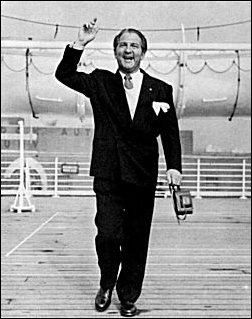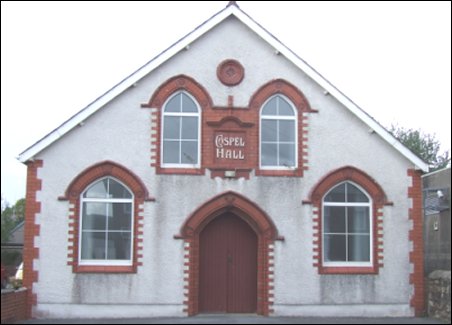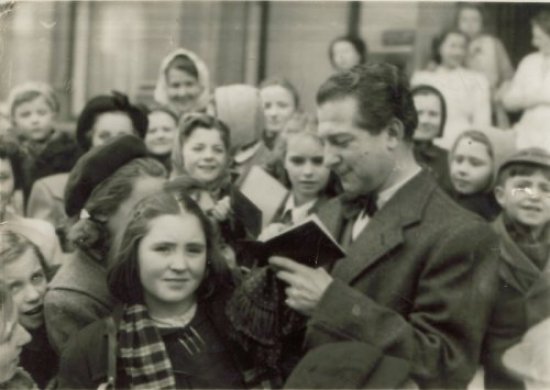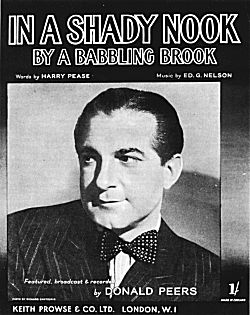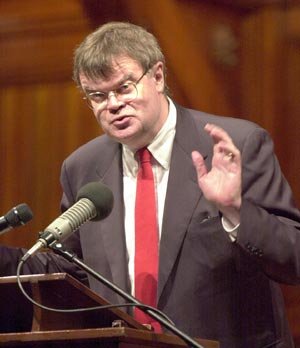DONALD PEERS
THE 1950s POP IDOL
Born Ammanford, July 10th 1908;
Died Brighton, August 9th 1973"Donald has known what it is to fail – what it is to be disappointed – and to be hungry. No beneficent genie spirited him to the top of the ladder ... Or to that Valhalla of all British and American variety artists, the top of the bill at the London Palladium. Slowly, painfully and undaunted, he himself climbed his ladder rung by rung. The ascent was long." (Daily Express music critic Collie Knox, from the Introduction to Donald Peers' autobiography 'Pathway', 1951, page 8)
1. Introduction
Before finding fame and fortune and becoming one of Britain's first pop idols, Donald Peers lived in Mill Road, Betws. The youngest son of five children born to Frank Peers and Mary Rees, he attended Amman Valley Grammar School where he was encouraged by his English mistress to pursue a career on stage. At one point during his time at school Donald Peers also had ambitions of becoming a teacher but somehow ended up a house painter. The outbreak of war interrupted his early singing career and he served as a clerk in the Royal Army Service Corps for four years. He benefited by his army life, as a long series of wartime concerts gave him confidence on stage. After the war he became popular in the provinces but was never a West End star until the BBC give him his big break on a radio programme in 1948. Before finding stardom, Donald had a series of jobs as a travelling painter and he was also a mess steward on ships. For a time he was forced to the draw dole in Ammanford and at one time almost resorted to street singing.
This story of a self-made lad from a Welsh mining town who ran away from home to become a world-famous entertainer is recounted by Peers himself in his 1951 autobiography 'Pathway'. It tells of a determination to succeed and a struggle against odds which, in the modem era – and given the right kind of marketing – would almost certainly have made him a global megastar: as it was, BBC radio's "Cavalier of Song" programme helped him achieve world-fame through his pleasant, personable crooning and a confident way with an audience.
But before we reach this point in his career we might pause and take a look at his early life as documented by himself in his autobiography. Donald Peers was born at 106 College Street, Ammanford, in the South Wales Amman Valley on July 10th, 1908, and grew up from the age of five in the neighbouring village of Betws. His mother, Mary Rees, was from Ystalyfera in the nearby Swansea Valley, and had gone to America to seek a cure for her early developing rheumatoid arthritis. As Donald Peers relates in his autobiography:
"... from her early years she suffered from rheumatic trouble. The accepted remedies of the day had no effect. Ebenezer [her father] and his wife became anxious and alarmed.
.....Then the name of a place in America was mentioned. Hot Springs, Missouri. Special treatment, to be obtained here and here only, might bring about a lasting cure. It seemed fantastic that such a journey could be contemplated, but it was contrived. Mother packed her modest belongings, and calmly set forth on a voyage which to her must have seemed to the ends of the earth.
.....And while far from the scene of her native valleys and hillsides, she met my father, fell in love and promptly married him. That was in 1894." ('Pathway', page 16)Donald Peers describes his father, originally from the village of Ash, near Canterbury in Kent, as
"... a born rover. As a young man he wished for nothing better than to roam over the face of the earth, passing contentedly from one job to another as the spirit moved him. He was to live a great part of his life in Wales, and to pass into a serene old age there, but he is Welsh by adoption only ... Father's journeyings took him to many strange places. He coolly worked his passage to Africa, thence to Johannesburg, Durban, Natal and Cape Colony, and eventually found his way to New York. He took any job that came his way, surveying the changing scene with a keen interest in his fellow creatures. He finally found himself work in the stockyards of Chicago in the year of the great World's Fair of 1893. Here, in this grim and bustling city, which must have presented a vastly different world from the peaceful, leisurely Canterbury he had left behind, he met Mary Rees." ('Pathway', pages 16-17)
Frank Peers and Mary Rees married in America in 1894 where their first two sons were born. They then returned to Wales, first to Ystalyfera where Frank worked in the printing works of his wife's father, Ebenezer Rees. Ebenezer Rees had founded not just the family printing firm, which his three sons ran after his death, but also the leading political newspaper in Wales called 'Llais Llafur' (Voice of Labour). For some reasons Frank Peers' employment by his father-in-law did not prove an ideal arrangement and he applied for and was given a job as a clerk in a sawmill in Ammanford. Two daughters and Donald were born in Ammanford. During the depression yeas of the 1930s Frank Peers lost his white collar job in the sawmills and took work as a surface worker at the local coal-mine.
2. Religious upbringing in the Plymouth Brethren
During his time in Ammanford Frank Peers was a respected Elder of the Plymouth Brethren at Ammanford's Gospel Hall and a lay-preacher who had been converted during his younger days spent in Chicago (see the note below on the Plymouth Brethren). As Donald Peers relates:
"My father, as I came to know him, has always been a man of the highest religious principles, a godly and upright character if ever there was one. It was while still in Chicago, I have heard him say, that his religion became a ruling force in his life, or, as some would say, he was "converted". He, and my mother with him, became members of the Plymouth Brethren. The young Englishman, who held his own with the roughest and toughest characters who wrested a living in the vast stockyards, became an evangelist and lay preacher." ('Pathway', page 17)
The Plymouth Brethren were established in Ammanford as far back as 1884; they initially used local halls such as the long-vanished Ivorites Hall and Rechabites Hall for their worship, until they built their own church in Ammanford in 1911. The Plymouth Brethren have a reputation for a very severe lifestyle by the standards of most other churches, and although the Ammanford brethren belong to the more moderate 'Open' branch of that church, we get occasional glimpses into this side of them in 'Pathway'. Here Donald Peers tells us his father never joined in any sports and had only once gone to a theatre after his conversion in 1894. Even when his son returned to give concerts in Ammanford after he'd become famous, Frank Peers refused to attend, listening instead on the radio. His father's daily routine is also described:
"Father was busy each night at some meeting or other with the Brethren at the Gospel Hall. He was completely and happily immersed in his religion. Each morning, before leaving for work at six o'clock, he would read a chapter of the Bible. Home again at about three-thirty in the afternoon, he would bath and then, like a true son of Kent, work for a while in his garden. Later, the Bible was taken down again for a while, and then, between seven-thirty and eight o'clock, he would quietly make his way to the Gospel Hall. The family would attend chapel at least twice every Sunday, and much as I loved the old people, this was an environment that seemed too narrow to appeal to me as a setting in which to spend the rest of my life." ('Pathway', page 46)
The Gospel Hall, home of Ammanford's Plymouth Brethren. It was built in 1911 with a sloping floor to discourage the hall being used other than to preach the Gospel (no dancing!) Donald Peers' upbringing seems to have been quite easy-going in comparison to some other Plymouth Brethren families, or at least compared to those from the 'Exclusive' wing of the church, but even so, there was still a line which was not to be crossed:
"At a Sunday School Treat – I had "found my voice" by then – my contribution was a sacred song. Polite applause at the end must have turned my head, for I immediately burst into a completely unrehearsed and unsolicited encore, and I sang with glee and gusto.
.....I shall never forget how the faces round me grew sterner with each line-especially my father's. One glance at the look on his face made me realize the fate that was in store for my temerity. But even in those days there must have been in me the germ of the performer who, having once started, will go on to the bitter end in front of the most unsympathetic audience. On to the bitter end I went, amid a startled hush from my audience which was almost a tangible thing. And indeed the end was bitter – and my "end" was subsequently painful in the extreme.
.....It was early to bed that night, after one of the few severe spankings I remember. I avoided singing comic songs at any of the children's parties I went to in the future." 'Pathway', page 28.3. The serpent enters the Garden
Donald Peers seems to have got his interest in show business from his mother's side of the family in Ystalyfera, where his Uncle Elwyn ran a small cinema and theatre:
"The second delight was the way Uncle Elwyn allowed me to roam the stage and visit the projector room of the cinema. I am certain that the first seeds of longing for a life on the stage were planted during my visits to the Coliseum. The theatre, which had a seating capacity of about 300, prospered quite happily until the coming of the talkies."('Pathway', pages 28-29)
But more importantly in the house of his other uncle David, called Glanyronen, there was something else which his religious father wouldn't allow in their home in Ammanford – a piano and a gramophone:
"That piano was a thing of joy, but not only did Glanyronen possess this magnificent instrument but ... most miraculous of all – a gramophone. This ancient model, an H.M.V., gave me intense happiness. The voices that issued from the wide horn were metallic and nasal, but I was fascinated by them.
..... After many visits, when my good behaviour could be relied on, I was allowed to play records without anybody supervising. My two sisters and the three cousins would be off having fun of their own kind, and to play the gramophone to my heart's content was all I asked. There were tenors and contraltos singing arias of all descriptions, choral works and the rest." ('Pathway', page 27).This may give a hint as to why Donald Peers did something quite unexpected on the day before his 16th birthday: he ran away from home.
"During these formative years, in all perfect innocence I was unconsciously leading two lives. On the one hand there was the magic of the gramophone at Ystalyfera, the highly coloured posters outside the Coliseum which lifted the curtain and gave me a glimpse of another world outside the valleys. On the other there was our family life, linked with the daily practice of a simple faith. One was associated with Bible readings, and the glowing, inspired oratory of the Chapel Elders. The other drew me irresistibly to a world where men and women became stars of the stage and of the screen, and earned a living, not in monotonous daily toil, but actually by doing something they enjoyed." (Pathway, pages 30-31)
Donald's childhood had been hard-working, God-fearing, poor but essentially happy. As a youth he tinkled the keys on his uncle's piano, listened to gramophone records of famous British music hall singers and played leads in school amateur dramatics. However, as his opportunities for growth were, by his own account, limited by his cloistered valley environment, in July 1924, on the eve of his 16th birthday, he ran away from home in search of fame and fortune. However, after making his momentous break for freedom, the fame and fortune he sought turned out to be nothing more than roaming from job to job and from cheap boarding house to cheap boarding house as a painter and decorator. He'd left Ammanford to join two itinerant painters he'd met while they were working on Ammanford Station and in the process acquired a trade which, while not exactly providing the glamour he was searching for, at least held him in good stead during the tough times that lay ahead.
4. Tentative start to singing career – with a megaphone
It was while working on a painting contract in Richmond, Yorkshire that he met his future wife Marie, in May 1926, whom he was to marry in 1930. Their daughter, Sheila, was born in 1931. It was in Richmond too, while still employed as a painter, that he first started singing professionally at local dances. A local hairdresser also provided the music at most of the local dance halls and invited Donald Peers to join him as the dance-band singer. As this 'dance-band' consisted of a trio of piano, drummer and 'hot' fiddle-player, it was fortunate that the trade descriptions act was a long time in the future. As Peers relates in 'Pathway: "I accepted joyfully, and quite soon I was turning out four or five times a week, singing perhaps thirty songs a night for five shillings". ('Pathway', page 68). These were the days before microphones were regularly used for live music and Donald Peers tells us he sang these songs through a megaphone!
At first, Peers eked out a living in various capacities – mainly contract painting of army barracks in Aldershot and Edinburgh. But by the late 1920s, spurred on by his penchant for music hall and variety, and encouraged by the reception of his occasional appearances in concert parties, he took himself off to London. He entered talent competitions in 1920s equivalents of karaokes promoted by Fred Karno and others (it was Fred Karno who had discovered Charlie Chaplin), initially without success, while meanwhile clinging as a lifeline to his 'day job' as a painter. He eventually found an opening and gave his first BBC broadcast, at the age of 19, on December 17, 1927, and he tells us: "one of [his] songs was about a shady nook by a babbling brook" – later to become his theme-song.
Donald Peers continued in concert parties and pantomime and made his London debut in a Bedford Theatre revue in 1929. The depression years of the early 1930s were a difficult environment for a self-appointed entertainer who lacked the right contacts, however keen and talented, and opportunities were few. The dance orchestras by now were employing vocalists, it is true, but many of these were also established resident sidemen. Donald could dance and (after coaching from Californian ace M. Fowler) played the banjo and ukulele competently but he was essentially a straight vocalist. While in that department he found stiff competition, but he struggled on (even, on occasions, trudging the streets looking for work) until 1933 when, after appearing in the BBC's Music Hall programme, he earned the praise of Daily Express music critic Collie Knox which opened the door to a record contract with His Master's Voice.
Throughout his autobiography Peers always speaks with the deepest affection of his mother, yet curiously he decided not to attend her funeral when she died in Ammanford in 1929. Instead he chose to stay for an (unpaid) concert engagement in London because, he tells us in his autobiography, he had been promised a good spot on the bill. This is all somehow out of character for the mother he describes in words such as these:
"Let me describe my mother. She was not very tall, but she moved about our house and walked along the streets, with a dignity which was almost regal. Her face smiled the kindest of benedictions on all she met, and her eyes, very wide-set and deep brown, seemed to hold the wisdom of all the world. She gave everyone her undivided attention and was greatly loved." (Pathway, page 20)
But not enough to warrant attending her funeral, it would seem. His father, Frank Peers, died on the 14th May 1953 and is buried in the Gospel Hall cemetery, Tycroes.
5. The war years and beyond
The outbreak of war interrupted his early singing career and he served as a clerk in the Royal Army Service Corps for four years. He managed during this time however to continue his singing career, both in forces concerts and regular broadcasts for the BBC.
After the war, via his own BBC Light Programme radio show 'Cavalier of Song', he became Britain's number one popular vocalist and in 1950, following a throat operation, made a triumphant return with a one-man show at the Royal Albert Hall and topped the bill at a Palladium Royal Variety Command Performance. Despite the 1950s craze for rock 'n' roll he held his own with audiences, making frequent appearances on the Northern British club circuit and also extensive tours of Australia.
Donald Peers signing autographs in Ammanford on 1st April 1950. His lucky break had come in 1948 when the BBC asked him to do a half hour radio programme for a few weeks. In five broadcasts, singing such songs as 'A Slow Boat to China' and 'By a Babbling Brook', he shot to fame. At the age of 42, he became a pop idol and was known as radio's 'Cavalier of Song'. Donald made BBC musical history by earning £600 per week (multiply that by 20 in today's money) and receiving 3,000 fan letters a week. His fame and fortune continued for five years until he decided to go to Australia where he stayed for two years. When he returned to England the fans had forgotten him. He began to work his way back to stardom through the club circuit and began to hit the pop charts again with a revival of romantic ballads. He had comeback hits in the British charts with "Please Don't Go" (1969) and "Give Me One More Chance" (1971). Perhaps his greatest professional triumph came on the 9th May 1949 when he gave a solo performance at the Albert Hall, London. An audience of 8,602 paying people heard him give a two hour solo performance accompanied only by two pianists.
By the early 1960s he was sufficiently re-established on the show business circuit to be given his own programme on television, which was just overtaking radio as the dominant broadcasting medium. His programme was called 'Donald Peers Presents' and in 1962 he gave a young pop singer his first exposure on British TV. That young singer's name was Tom Jones and he made enough of an impression to be recalled for another programme later. The rest, as they say, is history.
During one of his visits to Australia, he fell down a hole on stage in Sydney and broke his back. He was strapped in a steel harness, lost two inches of his height and was told he would never walk again. He did though eventually regain his ability to walk and perform.
He also made several films including 'Sing Along With Me'. His record successes include: 'The Last Mile Home', 'Dear Hearts and Gentle People' and 'Out of a Clear Blue Sky'. His best known hit however was 'In a Shady Nook, by a Babbling Brook'. There is a popular belief in Ammanford and Betws that Nant y Ffin flowing through Betws into the river Amman is the brook mentioned in the song (nant = brook; ffin = boundary). However, research has shown that this song was in fact written in 1927 by the Americans E. G. Nelson and Harry Pease (see photograph, right, of the sheet music of this song – cost: one shilling).
The legend may have arisen because Donald Peers was said in his younger days to have sat on an outstretched branch of an old oak tree beside the Nant y Ffin brook, writing songs. Inspired by the soothing sounds of the running water it is possible that it was beside Nant y Ffin that he wrote some of the songs that in later life turned him into a household name.
Donald Peers died in a Brighton nursing home on the 9th August 1973 at the age of 65 and his remains are buried in the Downs Crematorium in Brighton. At the height of his fame in 1951 he wrote an autobiography entitled 'Pathway' which is his account of his progress from Betws and Ammanford to the Albert Hall. To see the first four chapters of 'Pathway' which deal with his Ammanford years click HERE.
6. A Babbling Brook
For those who feel the urge to burst into song, here are the lyrics of Donald Peers' theme song, "In a Shady Nook", which he performed at all his concerts. All together now ...
IN A SHADY NOOK, BY A BABBLING BROOK
.................Words – Harry Pease
..................Music – E G Nelson[Click HERE for a crackly version
.of Babbling Brook on You Tube]Chorus
In a shady nook, by a babbling brook,
'mid the flow'rs, I spend hours, ev'ry day;
that old shady nook, and that babbling brook,
they're my mem'ry's book, since you're away.
I can hear the strain, of the bird's refrain,
but it's not the same, since you have left me;
in a shady nook, by a babbling brook,
that's where I fell in love with you.Verse
Where do I wander in springtime,
when the violets say "Howdy do"?
Where do I go in the summer,
when the skies are so peaceful and blue?
Where do I go every morning,
And linger the whole day through?
Where do I go when the stars are aglow
And dream of the byegones and you? In a (To chorus)Chorus
shady nook, by a babbling brook,
'mid the flow'rs, I spend hours, ev'ry day;
that old shady nook, and that babbling brook,
they're my mem'ry's book, since you're away.
I can hear the strain, of the bird's refrain,
but it's not the same, since you have left me;
in a shady nook, by a babbling brook,
that's where I fell in love with you.Verse
Down thro' the pathway I'm roaming,
to the tree where we both carved our name.
Down thro' the lane in the gloaming,
in the wild wood I wander again. In a (To Chorus)7. Sources:
– Donald Peers: Pathway: an Autobiography, London 1951'
– Peter Dempsey (2001) from notes to Living Era CD Donald Peers, Cavalier of Song (CD AJA 5411)
– Betws Mas o'r Byd (Betws Beyond the World), Betws History Group 2001.8. Note on The Plymouth Brethren
As we have seen above, Donald Peers was born into a Plymouth Brethren family; his father Frank (who died on the 14th May 1953 and is buried in the Gospel Hall cemetery, Tycroes), was a respected elder in this church, so it is worth making a slight detour into the world of this evangelical movement his son had been born into, and was eventually to reject. The Plymouth Brethren were – and indeed still are – an evangelical and fundamentalist Christian Protestant sect characterized by extreme simplicity of belief and living. The movement was founded in Dublin about 1827 by the Reverend John Nelson Darby (1800 - 1882), a one-time Anglican priest (hence they are sometimes called Darbyites). An assembly was held in Plymouth in 1831 to celebrate its arrival in England (from where the name derives) but in obedience to some mysterious law that sees all human organisations eventually separate into warring parties, by 1848 the movement had split into 'Open' and 'Exclusive' factions. The 'Open', more moderate wing of the church happily accept non-members into their church services while the 'Exclusives' refuse communion to all those not of their persuasion. The Brethren have no organised ministry or central authority, each church being self-governing and they lay emphasis instead on the 'breaking of bread' (ie the Eucharist) each Sunday. The Plymouth Brethren are found mainly, though not exclusively, in fishing villages of N.E. Scotland. In Ammanford they are more commonly known as 'Gospel Hall' after the name of their church in Lloyd Street. There is also a Gospel Hall in Tycroes, near which is the Brethren's cemetery for the locality. Frank Peers is buried in this Tycroes burial ground but not his son Donald – in fact, it's not known where Donald Peers is buried, though in all probability it's somewhere in Brighton, where he died.
The children of church members were brought up with the utmost strictness: the Brethren (that is their favoured name) disapprove of all forms of entertainment, including sport, dancing, cinema and theatres, with public houses and alcohol being especially singled out for their disapproval. Even books, other than the Bible and certain devotional works, were banned from some Brethren households. The untold tensions that such severe restrictions can cause between parents and children may easily be imagined, especially in the twentieth century when mass entertainment took off explosively from the 1920s onwards.
Garrison Keillor
Garrison Keillor broadasting A Prairie Home Companion. The best known poduct of the Plymouth Brethren is the American author Garrison Keillor. Keillor, born into the Exlusive wing of the Brethren in Anoka, Minnisota, on the 7th August 1942, is an author, storyteller and humorist known for his Midwestern roots. The Brethren forbid members to engage in dancing, drinking, and cards, so his family became adept story tellers.
He wanted to write, and set a goal of writing for the New Yorker, which he first did in 1969. After doing a story on the Grand Ole Opry for the New Yorker, he decided to try his own radio variety show called A Prairie Home Companion. This was an instant hit, and went national in 1980, on the strength of the stories Keillor told of the mythical community of Lake Wobegon.
As host of A Prairie Home Companion and author of the best-selling Lake Wobegon Days, Keillor has made a career of telling stories about the fictional Minnesota town of Lake Wobegon and the lives of its residents. Keillor has become an American icon, and his show is heard by nearly three million U.S. listeners each week on over 500 public radio stations. It is also heard overseas on America One and the Armed Forces Networks in Europe and the Far East
He left the Plymouth Brethren when he was twenty and these days attends both the Episcopalian (American Anglican) and Lutheran churches.
For an interview Keillor gave to a British Plymouth Brethren journal in 1999 click HERE (The interview is a PDF file and will open in its own window, where it can be read or printed off.)
Date this page last updated: December 31, 2010
